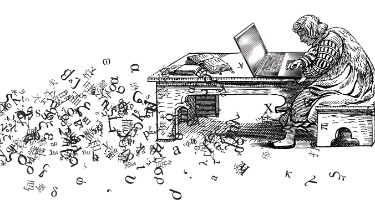It wasn’t so long ago that artificial intelligence (AI) was just a recurring character in dystopian visions of the future.
For decades, AI has been something just over the horizon—an object of fascination to science fiction buffs and scientists, perhaps, but not necessarily to the general public or the broader business community. When AI pierced the public’s consciousness at all, it was likely in the form of an existential threat. Think of Hal 9000, the computer taking over the spaceship in 2001: A Space Odyssey.
AI isn’t new. Its theoretical underpinnings go back at least seven decades, to figures such as British scientist Alan Turing, who is famous for cracking German war codes in World War II. With steady advances in computer processing speeds, data storage and analytics, natural language processing, and other areas, all of that has begun to change. But the speed of that change has surprised many.
Technology research organization Gartner Inc., for instance, recently identified artificial intelligence as the top technology trend for 2017,1 and yet it didn’t even crack Gartner’s top 10 list two years earlier. The increasing visibility of cognitive systems such as IBM’s Watson, autonomous vehicles, and a host of virtual assistants like Apple’s Siri and Google Home have no doubt helped inject AI into the vernacular. Craig Courter, global chief operating officer of Chicago-based Baker McKenzie, says that “almost any legal conference you go to, they’re talking about this. There’s almost no firm that’s not paying attention to this issue.”
Lying behind much of that interest, of course, is the specter of humans being replaced by machines, but also the possibility of tremendous leaps in economic productivity. The consulting firm McKinsey & Company estimates2 that as much as $2 trillion of global economic activity could be diverted to automation simply by harnessing the technologies already available. But as advisory firm Accenture has noted,3 the real opportunities lie in imagining AI as not merely a productivity enhancer but as a new factor in production—what it calls “a capital-labor hybrid.”
This has led some researchers to near-apocalyptic predictions. A widely cited 2013 study by Oxford University estimates that nearly half of all U.S. jobs are susceptible to automation within the next 20 years. Technology maven Mark Cuban recently warned,4 “artificial intelligence, deep learning, machine learning … learn it. Because otherwise, you’re going to be a dinosaur within three years.” Meanwhile, Gartner predicts that by 2020,5 one of every five companies will dedicate staff to monitor and guide neural networks.
As vendors rush to acquire business with the latest AI solutions, the hype can sometimes overwhelm the facts. “It seems like any vendor who uses a computer and has an algorithm wants to label their technology AI,” says Courter. But true artificial intelligence requires authentic machine learning.
The Legal Landscape
AI has been used for years in legal electronic discovery. But more recently it has begun making inroads into other parts of the industry.
McKinsey estimates6 that 23 percent of a lawyer’s job can be automated. “The key is understanding what those areas are and doing something about it,” says Paige Kohn of Columbus-based Vorys, Sater, Seymour and Pease. “If AI can be leveraged so a lawyer can spend more time on advocacy, client interaction, analysis, writing, and strategy than on tasks that can be automated, then that would be very helpful for the practice of law as a whole.”
After all, AI technology can learn faster than humans, but not as deeply—at least at the present.
Getting there will no doubt involve some pain. “There’s a lot of breakage that’s going to occur in the meantime,” admits Courter. “The technology vendors say that it’s going to free everyone up for higher-value work. And yes, there will be higher-value work, and lawyers will always be needed for the judgment tasks. But as automation happens, there are going to be some of these positions that are just not needed. And that’s true for law firms, in-house counsel, and legal services providers. There has to be a (staffing) contraction as you adopt this technology.”
However, leaders in the legal profession point to how emerging technologies can also create whole new areas of potential work.
“When you look at big data, for example, consider a situation where a client has thousands of employment contracts that need to be reviewed for compliance with new state or federal law,” says Steve Fletcher, chief information officer for California-based law firm Best Best & Krieger. “Using an AI contracts analytics solution, you might be able to read through the entire document repository to highlight the top 10 percent of docs likely not in compliance. Then you could have your attorneys review those individually. Without the ability to target the non-compliant documents, you might not get a shot at that attorney review work.”
Early Adopters
Baker McKenzie has been among the early adopters of AI. Three years ago it opened an offshore office in Belfast, Ireland, where it employs lower paid, less experienced lawyers. In creating this new office, it layered in tools such as contract express and due diligence software. “We’re able to get the best of both worlds,” says Courter. Clients like that “we’re not putting expensive associates (on every case), but we do have a high-quality product to offer.”
For its part, Best Best & Krieger is now working on expert systems apps that will help navigate clients through the complexities of state and federal laws. “These will be intelligent decision-tree questions for phones, tablets, and PCs that will provide guidance, while at the same time identifying areas where our attorneys can and should be contacted for follow-up or further assistance,” says Fletcher.
It’s layered approaches such as this that help many firms remain upbeat about this emerging technology and think of it not as a zero-sum game that will replace human talent with robots but instead one that will represent more of an opportunity than a threat for the legal industry. Coulter says, “The lawyer who learns to ride up the value chain as these difficult issues come up, those who learn you’ve got to have the human layer for judgment tasks, is going to have more work and be found more valuable.
------------------------
1https://www.gartner.com/smarterwithgartner/gartners-top-10-technology-trends-2017/
2Wall Street Journal October 13, 2016, pg A10
3https://www.accenture.com/t20170206T005353__w__/us-en/_acnmedia/PDF-33/Accenture-Why-AI-is-the-Future-of-Growth.PDF#zoom=50
4https://bothsidesofthetable.com/mark-cuban-on-why-you-need-to-study-artificial-intelligence-or-youll-be-a-dinosaur-in-3-years-db3447bea1b4
5Gartner research study, “Predicts 2017: Artificial Intelligence.” November 23, 2016.
6https://www.nytimes.com/2017/03/19/technology/lawyers-artificial-intelligence.html






















